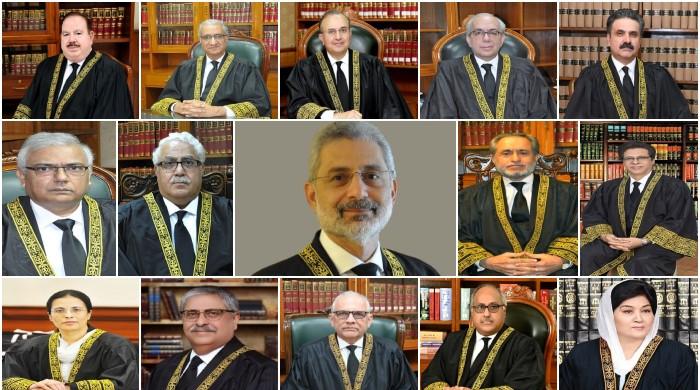ISLAMABAD: The full court proceedings on a set of petitions challenging the Supreme Court (Practice and Procedure) Act 2023 today (Monday) will be telecast live.
The decision was made in the full court meeting ahead of the hearing on the petitions, sources confirmed to Geo News, adding that five cameras are being installed in courtroom number one. Four cameras have also been installed in the visitors’ gallery and one is installed for the lawyers’ rostrum in front of the judges’ docks.
The law under scrutiny deals with the powers of the top judge in matters of public interest and is aimed at clipping the suo motu powers of the apex court’s top judge.
On April 13, an eight-member bench of the Supreme Court led by then-CJP Umar Ata Bandial stopped implementation of the law.
A day earlier, the full court was constituted by the newly-appointed CJP and included Justice Sardar Tariq Masood, Justice Ijazul Ahsan, Justice Syed Mansoor Ali Shah, Justice Munib Akhtar, Justice Yahya Afridi, Justice Aminuddin Khan, Justice Sayyed Mazahar Ali Akbar Naqvi, Justice Jamal Khan Mandokhel, Justice Muhammad Ali Mazhar, Justice Ayesha A Malik, Justice Athar Minallah, Justice Syed Hasan Azhar Rizvi, Justice Shahid Waheed and Justice Musarrat Hilali.
Prior to the hearing of the case, a full court meeting was held earlier today to consider live broadcasting of proceedings and ponder over guidelines for effective hearing of cases. According to sources, instructions for the live broadcast were issued yesterday — hours after Justice Isa took oath as the CJP.
Upon his arrival at the court, CJP Isa — who arrived at the apex court protocol in his personal car — told the staff: “People come to the Supreme Court for the resolution of their problems. Treat them [visitors] like guests.”
He further said that the doors to justice should be kept “open and smooth”.
During the previous hearing in June, the similarities between the Supreme Court (Review of Judgments and Orders) Act 2023 — which relates to the right of appeal in suo motu cases — and the SC Practice and Procedure Act were discussed with Attorney General for Pakistan (AGP) Mansoor Usman Awan saying that parliament could look into “harmonising” the two laws.
The then-CJP — while he welcomed the proposal — said that the federal government should take the top court into consideration when making any legislation related to the judiciary.
The law
The law gave the power of taking sou motu notice to a three-member committee comprising senior judges including the chief justice. It further aimed to have transparent proceedings in the apex court and includes the right to appeal.
Regarding the constitution of benches, the Act stated that every cause, matter or appeal before the apex court would be heard and disposed of by a bench constituted by a committee comprising the CJP and the two senior-most judges.
It added that the decisions of the committee would be taken by a majority.
Regarding exercising the apex court’s original jurisdiction, the Act said that any matter invoking the use of Article 184(3) would first be placed before the committee.
On matters where the interpretation of the Constitution is required, the Act said the committee would compose a bench comprising no less than five apex court judges.
About appeals for any verdict by an apex court bench that exercised Article 184(3)‘s jurisdiction, the Act said that the appeal would lie within 30 days of the bench’s order to a larger SC bench. It added that the appeal would be fixed for hearing within a period not exceeding 14 days.
It added that this right of appeal would also extend retrospectively to those aggrieved persons against whom an order was made under Article 184(3) prior to the commencement of the SC (Practice and Procedure), Act 2023, on the condition that the appeal was filed within 30 days of the Act’s commencement.
The Act additionally said that a party would have the right to appoint its counsel of choice for filing a review application under Article 188 of the Constitution.
Furthermore, it states that an application pleading urgency or seeking interim relief, filed in a cause, appeal or matter, shall be fixed for hearing within 14 days from the date of its filing.




